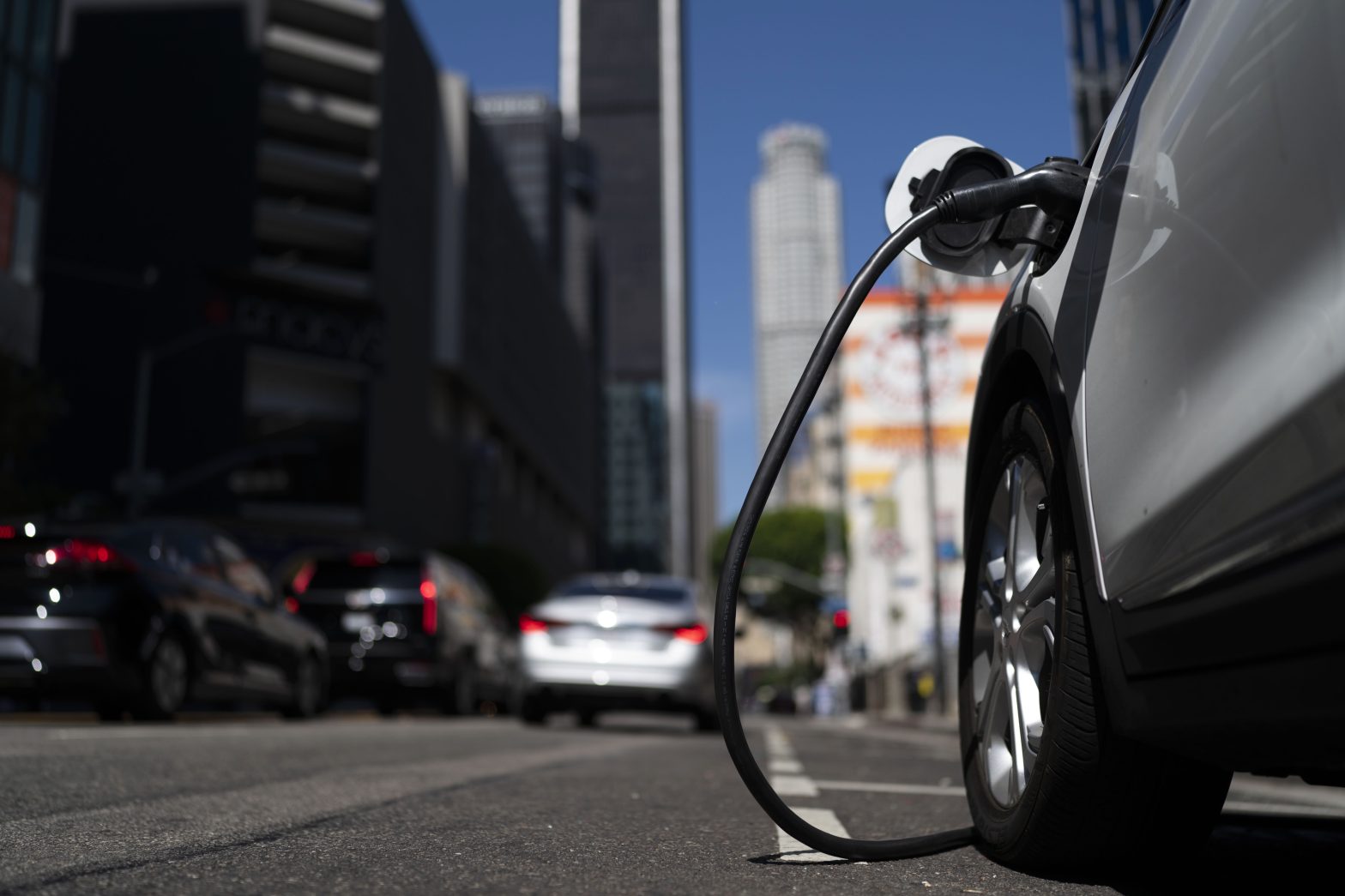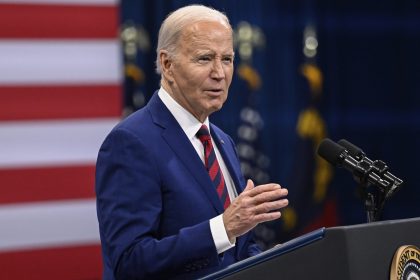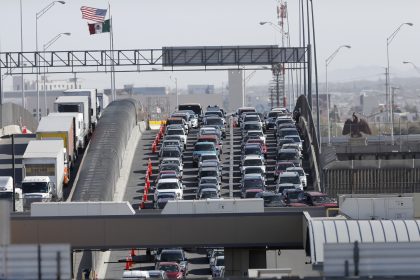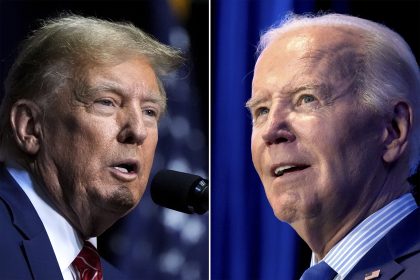4 in 10 Say Next Vehicle May Be Electric: AP-NORC/EPIC Poll

WASHINGTON (AP) — Many Americans aren’t yet sold on going electric for their next cars, a new poll shows, with high prices and too few charging stations the main deterrents. About 4 in 10 U.S. adults are at least somewhat likely to switch, but the history-making shift from the country’s century-plus love affair with gas-driven vehicles still has a ways to travel.
The poll by The Associated Press-NORC Center for Public Affairs Research and the Energy Policy Institute at the University of Chicago shows that the Biden administration’s plans to dramatically raise U.S. EV sales could run into resistance from consumers. Only 8% of U.S. adults say they or someone in their household owns or leases an electric vehicle, and just 8% say their household has a plug-in hybrid vehicle.
Even with tax credits of up to $7,500 to buy a new EV, it could be difficult to persuade drivers to ditch their gas-burning cars and trucks for vehicles without tailpipe emissions.
Auto companies are investing billions in factories and battery technology in an effort to speed up the switch to EVs to cut pollution and fight climate change. Under a greenhouse gas emissions proposal from the Environmental Protection Agency, about two-thirds of all new vehicle sales could have to be EVs by 2032. President Joe Biden has set a goal that up to half of all new vehicle sales be electric by 2030 to cut emissions and fight climate change.
But only 19% of U.S. adults say it’s “very” or “extremely” likely they would purchase an electric vehicle the next time they buy a car, according to the poll, and 22% say it’s somewhat likely. About half — 47% — say it’s not likely they would go electric.
Six in 10 said the high cost is a major reason they wouldn’t and about a quarter cited it as a minor reason. Only 16% said the high cost would not be a factor in rejecting the EV.
New electric vehicles now cost an average of more than $58,000, according to Kelley Blue Book, a price that’s beyond the reach of many U.S. households. (The average vehicle sold in the U.S. costs just under $46,000.) Tax credits approved under last year’s Inflation Reduction Act are designed to bring EV prices down and attract more buyers.
But new rules proposed by the U.S. Treasury Department could result in fewer electric vehicles qualifying for a full $7,500 federal tax credit later.
Many vehicles will only be eligible for half the full credit, $3,750, an amount that may not be enough to entice them away from less-costly gasoline-powered vehicles.
About three-quarters say too few charging stations is a reason they wouldn’t go electric, including half who call it a major reason. Two-thirds cite a preference for gasoline vehicles as a major or minor reason they won’t go electric.
“I’m an internal combustion engine kind of guy,” said Robert Piascik, 65, a musician who lives in Westerville, Ohio, a Columbus suburb. “I can’t see myself spending a premium to buy something that I don’t like as much as the lower-priced option.”
Although he has nothing against EVs and would consider buying one as the technology improves and prices fall, Piascik said the shorter traveling range, lack of places to charge and long refueling times would make it harder for him to go on trips.
In his 2017 BMW 3-Series, all he has to do is pull into a gas station and fill up in minutes, Piascik said. “The early adopters have to put up with a lack of infrastructure,” he said.
Biden has set a goal of 500,000 EV charging stations nationwide, and $5 billion from the 2021 infrastructure law has been set aside to install or upgrade chargers along 75,000 miles (120,000 kilometers) of highway from coast to coast.
Electric car giant Tesla will, for the first time, make some of its charging stations available to all U.S. electric vehicles by the end of next year, under a plan announced in February by the White House. The plan to open the nation’s largest and most reliable charging network to all drivers is a potential game-changer in promoting EV use, experts say.
High prices and a lack of available chargers are cited by at least half of Democrats and Republicans as main reasons for not buying an EV, but there’s a partisan divide in how Americans view electric vehicles. About half of Republicans, 54%, say a preference for gasoline-powered vehicles is a major reason for not buying an EV, while only 29% of Democrats say that.
James Rogers of Sacramento, California, a Democrat who voted for Biden, calls climate change an urgent problem, and he supports Biden’s overall approach. Still, he does not own an EV and isn’t planning to buy one, saying the price must come down and the charging infrastructure upgraded.
Even with a tax credit that could put the average price for a new EV close to $50,000, “it’s too much” money, said Rogers, 62, a retired customer service representative. He’s willing to pay as much as $42,000 for an EV and hopes the market will soon drive prices down, Rogers said.
In an encouraging finding for EV proponents, the poll shows 55% of adults under 30 say they are at least somewhat likely they will get an electric vehicle next time, as do 49% of adults ages 30 to 44, compared with just 31% of those 45 and older.
And people in the U.S. do see the benefits to an EV. Saving money on gasoline is the main factor cited by those who want to buy an EV, with about three-quarters of U.S. adults calling it a major or minor reason.
Making an impact on climate change is another big reason many would buy an EV, with 35% saying that reducing their personal impact on the climate is a major reason and 31% saying it’s a minor reason.
___
Krisher reported from Detroit.
___
The AP-NORC poll of 5,408 adults was conducted Jan. 31 to Feb. 15 using a combined sample of interviews from NORC’s probability-based AmeriSpeak Panel, which is designed to be representative of the U.S. population, and interviews from opt-in online panels. The margin of sampling error for all respondents is plus or minus 1.7 percentage points. The AmeriSpeak panel is recruited randomly using address-based sampling methods, and respondents later were interviewed online or by phone.

























